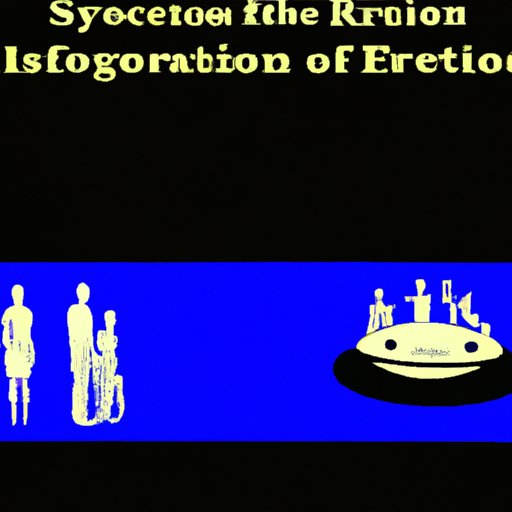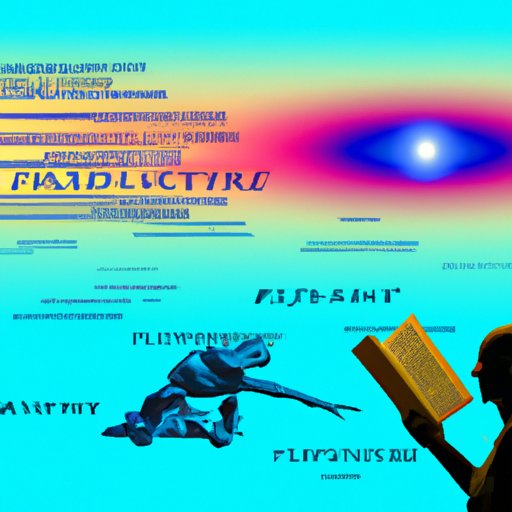Introduction
Science fiction is a vast and varied genre that has been captivating readers for centuries. From books to movies, video games to TV shows, science fiction has had a profound impact on popular culture and society as a whole. This article will explore the history and definition of science fiction, its various sub-genres, its impact on pop culture and society, and the artistry of its literature. We’ll also take a look at some of the genre’s most celebrated writers and their works.
Exploring the History and Definition of Science Fiction
The origins of science fiction can be traced back to ancient times, with many of the earliest stories featuring elements of fantasy and mythology. In his book Science Fiction: A Historical Anthology, editor Eric S. Rabkin states that “the boundary between myth and science fiction is almost impossibly thin” (Rabkin, p. 11). The modern form of science fiction emerged in the 19th century, when authors such as Jules Verne and H.G. Wells began writing stories that blended elements of science and technology with futuristic settings and speculative storylines.
Today, science fiction is defined by the Oxford English Dictionary as “fiction based on imagined future scientific or technological advances and major social or environmental changes, frequently portraying space or time travel and life on other planets” (Oxford English Dictionary). Science fiction is often used as a vehicle for social commentary, with authors exploring themes such as morality, ethics, human nature, and the effects of technology on society.
Examining the World of Science Fiction Through Its Most Popular Sub-Genres
Science fiction encompasses a wide range of sub-genres. Here we’ll take a look at some of the most popular, including space opera, cyberpunk, alternate history, apocalyptic and post-apocalyptic, and hard science fiction.
Space Opera
Space opera is a sub-genre of science fiction characterized by grandiose and melodramatic plots set in outer space. These stories often feature larger-than-life characters, interplanetary conflicts, and exotic alien species. Examples of popular space operas include the Star Wars and Star Trek franchises.
Cyberpunk
Cyberpunk is a sub-genre of science fiction that focuses on the interaction between humans and technology in an urban, dystopian setting. These stories often feature themes of artificial intelligence, corporate power, and rebellion against the system. William Gibson’s 1984 novel Neuromancer is credited with launching the cyberpunk movement.
Alternate History
Alternate history is a sub-genre of science fiction in which authors explore what would have happened if a specific event in history had occurred differently. Popular examples of alternate history include Philip K. Dick’s The Man in the High Castle and Stephen King’s 11/22/63.
Apocalyptic and Post-Apocalyptic
Apocalyptic and post-apocalyptic stories explore the aftermath of a global disaster, often focusing on the struggle for survival in a world filled with chaos and destruction. Notable examples include Cormac McCarthy’s The Road and Max Brooks’ World War Z.
Hard Science Fiction
Hard science fiction is a sub-genre of science fiction that emphasizes scientific accuracy and technical detail. These stories are often set in real or plausible future scenarios and focus heavily on scientific principles and theories. Notable examples include Arthur C. Clarke’s 2001: A Space Odyssey and Kim Stanley Robinson’s Red Mars.

Investigating the Impact of Science Fiction on Pop Culture
Science fiction has had a tremendous impact on pop culture over the years. Movies and television shows such as Blade Runner, Back to the Future, Doctor Who, and The Matrix have become iconic pieces of pop culture, inspiring countless imitations and homages. Science fiction has also had a profound influence on music, from David Bowie’s sci-fi-inspired concept albums to Daft Punk’s electronic odysseys. Video games such as Halo and Mass Effect have become hugely popular due to their imaginative settings and expansive universes.

Understanding the Role of Science Fiction in Society
In addition to its role in pop culture, science fiction has played an important part in shaping society. For example, the field of robotics was heavily influenced by the writings of Isaac Asimov, who developed the Three Laws of Robotics in his 1942 short story “Runaround”. The field of computer science was likewise influenced by the works of authors such as William Gibson and Neal Stephenson, who explored the implications of artificial intelligence and virtual reality in their novels.
Science fiction has also served as a platform for social commentary, with authors using the genre to explore themes such as racism, gender inequality, and the ethical implications of technology. For example, Ursula K. Le Guin’s The Left Hand of Darkness examines gender roles through the lens of a fictional alien society, while Frank Herbert’s Dune explores the politics of power and control in a feudal interstellar society.

Analysing the Artistry of Science Fiction Literature
At its core, science fiction is an art form, and some of the best science fiction stories are those that combine complex themes, compelling characters, and unique plot devices. Common themes in science fiction include exploration, evolution, and identity. Popular tropes include time travel, aliens, and artificial intelligence. Plot devices such as parallel universes, virtual reality, and robotic servants are often used to explore these themes and create fascinating stories.
Celebrating the Best Science Fiction Writers and Their Works
Science fiction has produced some of the most acclaimed and influential authors of all time. Isaac Asimov is widely regarded as one of the most important figures in the history of science fiction, thanks to classics such as I, Robot and Foundation. Ursula K. Le Guin is another key figure in the genre, having written groundbreaking works such as The Left Hand of Darkness and The Dispossessed. Other celebrated science fiction authors include Philip K. Dick, Frank Herbert, Ray Bradbury, and Margaret Atwood.
Conclusion
Science fiction has come a long way since its humble beginnings in the 19th century. Today, it is one of the most popular genres in literature, film, and entertainment. It has had a profound impact on pop culture and society, inspiring new ideas, technologies, and perspectives. Science fiction is also an art form, with its own unique themes, tropes, and plot devices. And its authors — from Asimov to Le Guin — are some of the most celebrated and influential in the literary world.
(Note: Is this article not meeting your expectations? Do you have knowledge or insights to share? Unlock new opportunities and expand your reach by joining our authors team. Click Registration to join us and share your expertise with our readers.)
